Maintaining a property’s roof is one of the most critical tasks for property managers. A well-maintained roof not only enhances the property's appearance but also ensures the safety and comfort of its occupants. Neglecting roof maintenance can lead to costly repairs, decreased property value, and potential hazards. Here are six essential roof maintenance tips that every property manager should implement to keep their roofs in top condition.
Schedule Professional Roof Cleaning
Regular roof cleaning is vital for maintaining the integrity and appearance of the roof by removing dirt, algae, moss, and other contaminants that can deteriorate the roof's surface. Property managers should arrange for professional roof cleaning services at least once a year to keep the roof in optimal condition and prevent damage caused by organic growth, experts from Certified Roofing Solutions explain. Professional cleaners are equipped with the knowledge and specialized equipment needed to perform thorough and safe cleaning, ensuring that the roof material is not damaged in the process. They use appropriate cleaning methods and solutions that effectively remove debris and growth without compromising the roof’s structure. By scheduling regular professional cleaning, property managers can extend the roof’s lifespan, enhance its visual appeal, and avoid potential issues related to algae and moss buildup.
Regular Inspections
Conducting regular roof inspections is the cornerstone of effective roof maintenance. Property managers should schedule bi-annual inspections, ideally during the spring and fall, to thoroughly examine the roof for any signs of damage or wear. During these inspections, check for missing or damaged shingles, cracks, leaks, and other issues that could compromise the roof’s integrity. Pay close attention to areas where water might pool, as well as the condition of flashings and joints. Regular inspections are crucial because they help identify minor problems before they escalate into major repairs. By catching and addressing issues early, property managers can prevent costly repairs and extend the roof’s lifespan. Regular inspections not only save time and money but also ensure the safety and comfort of the property’s occupants.
Prompt Repair of Damages
Addressing roof damage promptly is crucial to prevent further deterioration. When inspections reveal issues such as leaks, damaged shingles, or flashing problems, property managers should arrange for immediate repairs. Delaying repairs can lead to water damage, mold growth, and structural issues, all of which can be expensive and time-consuming to fix. Working with a reliable roofing contractor ensures that repairs are done correctly and efficiently.
Keep Gutters and Downspouts Clean
Clogged gutters and downspouts can cause significant roof problems if not addressed. Debris such as leaves, twigs, and dirt can accumulate in the gutters, leading to water overflow and potential roof damage. Property managers should ensure that gutters and downspouts are cleaned regularly, especially after storms or during the fall when leaves are abundant. Installing gutter guards can also help minimize debris buildup and reduce the frequency of cleaning.
Trim Overhanging Trees
Overhanging tree branches can pose significant risks to the roof, particularly during storms or high winds. Falling branches can damage shingles, gutters, and other roof components, potentially leading to costly repairs. Additionally, tree limbs that scrape against the roof surface can cause wear and tear, accelerating the deterioration of roofing materials. To mitigate these risks, property managers should regularly trim trees located near the property. Regular pruning helps to prevent branches from coming into contact with the roof, reducing the chances of physical damage. It also minimizes the amount of debris, such as leaves and twigs, that can clog gutters and downspouts. By keeping trees well-trimmed, property managers can protect the roof’s integrity, extend its lifespan, and maintain the overall condition of the property.
Ensure Proper Ventilation
Proper roof ventilation is crucial for maintaining the health of the roof and extending its lifespan. Adequate ventilation helps regulate both temperature and moisture levels in the attic, which prevents problems such as heat buildup, ice dams, and mold growth. Effective ventilation systems include both intake vents, which allow fresh air to enter, and exhaust vents, which enable hot, moist air to escape. Property managers should ensure that these ventilation components are properly installed and functioning. Regularly checking and maintaining the ventilation system is essential to avoid potential issues and costly repairs. By ensuring optimal ventilation, property managers can also enhance the energy efficiency of the property, as proper airflow helps reduce heating and cooling costs.

Effective roof maintenance is a critical responsibility for property managers, ensuring the safety, durability, and aesthetic appeal of the property. By conducting regular inspections, promptly repairing damages, keeping gutters clean, trimming overhanging trees, ensuring proper ventilation, and scheduling professional roof cleaning, property managers can significantly extend the lifespan of their roofs and avoid costly repairs. Implementing these six essential roof maintenance tips will help property managers maintain their properties in optimal condition, providing peace of mind for both the managers and the occupants.










